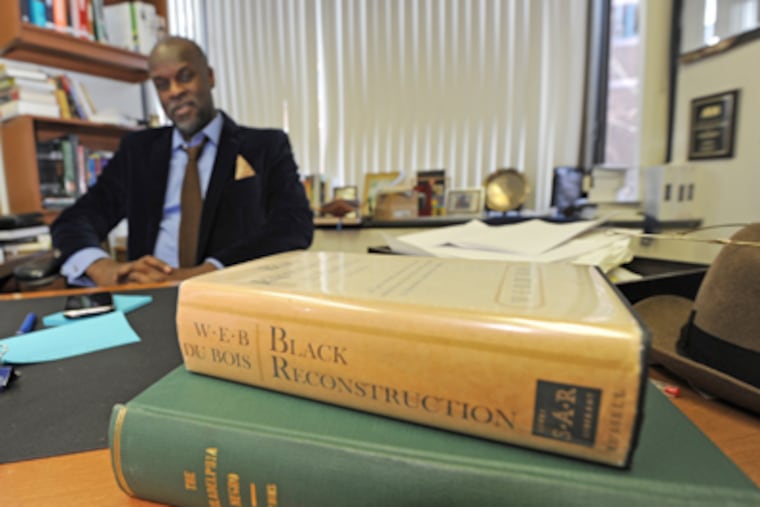Annette John-Hall: Penn will bestow long-overdue honors on W.E.B. Du Bois
In just a few weeks, long-overdue history will have its reckoning: William Edward Burghardt Du Bois will be appointed an honorary emeritus professor of sociology and Africana studies at the University of Pennsylvania.

In just a few weeks, long-overdue history will have its reckoning: William Edward Burghardt Du Bois will be appointed an honorary emeritus professor of sociology and Africana studies at the University of Pennsylvania.
Posthumously, of course.
It's been 116 years since Du Bois arrived on Penn's campus as an "assistant lecturer"; 49 years since his death at the ripe old age of 95 in 1963.
No matter. History deferred is still history, if corrected.
Which is what Tukufu Zuberi, chairman of Penn's sociology department, intended a year ago when he made it his mission to honor Du Bois.
For sociologists, "W.E.B. Du Bois is our beacon," Zuberi says. "If you're a scholar, he's that light that's shining brightly that you know is real. You just knew his intellect was going to make the world better."
Indeed, Du Bois' landmark sociological work, The Philadelphia Negro, researched and written while at Penn, stands as the first scientific sociological study in the United States, and it was the first scientific study of African Americans.
No limitations
Still, to limit Du Bois' influence to sociology alone is to limit the man himself. Talk about a curriculum vitae - scholar, civil rights activist, author, editor, pacifist, and Pan Africanist - Du Bois was arguably the greatest champion of black culture in the 20th century.
And on Feb. 17, he will be celebrated for his scholarship with the highest academic distinction during a full day of panel discussions, art, and musical tributes that, in typical Du Boisian style, will be open to the public.
It will be an intellectual conference "but it ain't no egghead thing," Zuberi says. "It's a conference that says, 'Let me talk to people in a multitude of ways.' "
It's not surprising that racism prevented Du Bois from blossoming at Penn. Never mind that the Harvard doctorate had already written a well-received scholarly work, The Suppression of the African Slave Trade to the United States of America, before even coming to Philadelphia. It never entered the minds of the Penn brain trust to award Du Bois a professorship.
Skin color trumped common sense back then.
Unspoken policy
"Penn had an unspoken policy that they couldn't hire an inferior individual to work at their prestigious institution. Du Bois was black and therefore considered inferior," Zuberi says.
But Du Bois didn't let the sting of discrimination stop him from achieving. After spending a year in University City, he moved to Atlanta University (now Clark-Atlanta University), a historically black college. There, he wrote his groundbreaking 1903 book of essays, The Souls of Black Folk, from which his prophetic prediction, "The problem of the 20th century is the problem of the color line," was oft-quoted going into the new century.
All the while, Du Bois created the template for how a true public intellectual should act. He continued to publish, and spoke out on everything from imperialism abroad to lynching at home. He led the struggle for civil rights. He co-founded the NAACP.
Heck, if Du Bois were around today, I bet he'd have more Twitter followers than Lady Gaga.
"Many of these cats who call themselves public intellectuals today may be rhetorical geniuses but they're solid nothings," Zuberi says. "Du Bois was a public intellectual who could write solid social science that my mama could read."
Zuberi, 52, uses Du Bois as a role model for his own career. A scholarly author, editor, and filmmaker, Zuberi also has a distinctly populist bent - he's been one of the hosts of History Detectives on PBS for the last four years.
"Du Bois used his social science to address the problems of the day," Zuberi says. "I would hope that I could be loyal to his principles - beyond thinking about tenure and promotions."
Contact Annette John-Hall at 215-854-4986, Ajohnhall@phillynews.com, or @Annettejh on Twitter.